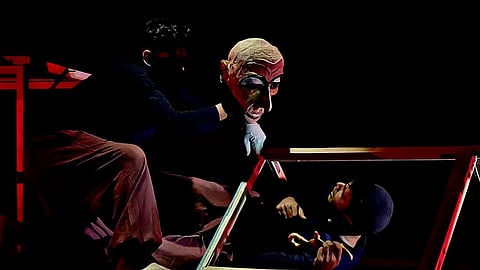
- LIFESTYLE
- FASHION
- FOOD
- ENTERTAINMENT
- EVENTS
- CULTURE
- VIDEOS
- WEB STORIES
- GALLERIES
- GADGETS
- CAR & BIKE
- SOCIETY
- TRAVEL
- NORTH EAST
- INDULGE CONNECT

Anurupa Roy’s love for puppetry began at six when her parents gifted her a puppet. “I was performing all the time, fascinated by this world of objects, dolls, and puppets,” she recalls. Her interest grew in school when she discovered Delhi’s first permanent puppet theatre at the Shri Ram Centre, run by Dadi Pudumjee, founder of The Ishara Puppet Theatre Trust. At the time, puppetry was seen as a children’s art form. But in college, Roy realised its broader potential. “I was 19, performing for friends, and I knew puppetry could engage adults too.” In 1998, she founded Katkatha, which in 2006 was recognised as Katkatha Puppet Arts Trust, now a pioneering contemporary puppetry company.
Retelling Arabian nights
Now, with over 25 years of experience, Roy and her team are set to stage The Nights at the Triveni Theatre Festival—a retelling of 1001 Arabian Nights, co-written by Neel Chaudhuri and Adithi Rao. The play follows King Shahryar, who, after betrayal, vows to marry and execute a new woman daily—until Scheherazade outwits him with unfinished stories, delaying her fate night after night.
The production began in 2020 with French director Sylvie Baillon joining a Katkatha workshop. The pandemic stalled progress, but the script continued evolving. Despite setbacks, The Nights premiered at Festival Mondial des Théâtres de Marionnettes in 2021.
Roy had long envisioned staging The Nights. “Some stories refuse to leave your mind,” she explains. “I was drawn to its layered storytelling—because life, too, isn’t linear. We’re always living multiple narratives at once.” What resonated most was Scheherazade’s power—“Shahryar has authority and soldiers; she has only stories. Yet, through storytelling, she transforms him.”
The performance will feature human-sized puppets, designed to resemble the faces of their puppeteers. Roy explains that this choice blurs the line between puppet and puppeteer. “Some of the puppets I move look like me because, in one moment, I am the actor, and in another, I become the puppet.” The performance also incorporates masks and shadow puppetry to bring multiple tales to life. “We tell the stories of Aladdin, Alibaba, Sinbad the Sailor, and Abu Hassan, along with mentions of others. It’s impossible to cover all 700 stories, but our goal was to embrace the essence of multiple narratives through diverse puppet forms.”
Puppetry beyond entertainment
Roy views puppetry as more than just performance—it’s a powerful tool for social change. “Puppets can say and do things humans can’t,” she explains. During the lockdown, she collaborated with the Population Council on a project addressing gender violence and adolescent health in Uttar Pradesh and Bihar. Using shadow and tabletop puppets, Katkatha created 30 visual and radio segments screened in remote villages, sparking dialogue on taboo topics like STDs and domestic violence.
She also partnered with NGO Parmarth in Bundelkhand to break the stigma around menstrual health. “At first, girls hesitated to speak. But when fairy puppets told stories, they opened up. Now, they perform plays in schools to spread awareness.”
Since the ’90s, Roy has seen India’s puppetry scene expand. She explains that she has seen two major shifts in Indian puppetry. “There is a rise in young puppeteers—once rare, now encouraged by formal training,” she says. Additionally, puppetry has expanded beyond performance and entertainment. “It’s now used in psychosocial work, education, and visual arts,” says Roy, highlighting its growing impact.
“The future of puppetry in India is exciting,” she says. “Every day, I learn something new about puppets—they reveal hidden possibilities. They offer another life, another way to see the world. And because of that, the world remains endlessly fascinating.”
'The Nights’ will be staged on March 24 at 7:30 pm at Triveni Amphitheatre, Triveni Kala Sangam, Mandi House.
This article is written by Adithi Reena Ajith